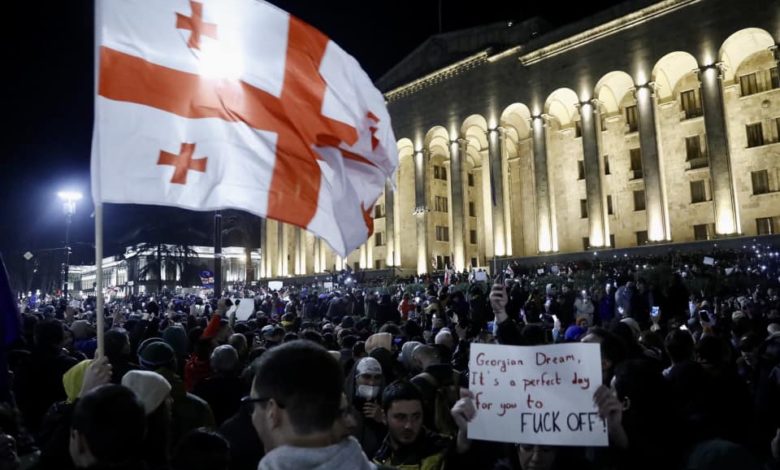
Georgia in HRW World Report
The Human Rights Watch, an international human rights monitoring organization, issued on January 12 its annual World Report, which includes a chapter on Georgia according to which the human rights record remained uneven in the country in 2023.
The report says that in 2023 the tensions over the Georgian government’s implementation of the European Union’s twelve recommendations dominated the political agenda. The HRW also highlights the government’s failed attempt to pass the so-called “foreign agents” law back in March 2023, which would have undermined the freedom of expression in the country.
Overall, the report highlights the continued lack of accountability for law enforcement abuses in Georgia, particularly in relation to freedom of assembly. Other problematic issues included restrictions and attacks on media freedom, unfair labor conditions, and the lack of inclusion of the LGBT community in the National Human Rights Strategy. Finally, the report summarizes the positions of key international actors on the main developments in Georgia.
Freedoms of Association and Expression
The HRW report highlights the controversial bill requiring NGOs and media outlets that receive 20 percent or more of their annual revenues from abroad to register as ‘agents of foreign influence’.
The report highlights that the ruling Georgian Dream party ultimately withdrew the bill due to the public protest, but “the government’s hostile rhetoric toward civil society organizations persisted throughout the year.”
The report also mentions the Georgian State Security Service’s claims and investigation into an alleged plot funded by the USAID, which the SSSG claimed is aimed at toppling the Georgian government.
Law Enforcement Abuses and Lack of Accountability
The Human Rights Watch cites the Public Defender’s Office and the CSOs which have “reported several instances of excessive use of police force and unlawful state interference with freedom of assembly in 2023.”
The report recalls the riot police using water cannons and massive amounts of tear gas to disperse thousands of peaceful demonstrators who spontaneously gathered to protest the “foreign agents” bill. The PDO said these measures were disproportionate and unnecessary. The Special Investigation Service (SIS), which investigates instances of abuse of office, launched an investigation into police conduct during the protests after receiving 124 complaints about abuse. The investigation was pending at time of writing of the reports.
The Human Rights Watch report also mentions the concerns about problem of police use of administrative charges to detain peaceful protest participants. “Court rulings on administrative offenses are often based solely on the testimonies of police officers and disregard fair trial norms.”
Attacks on Media
According to the report, numerous threats and attacks targeted media professionals in 2023. “By October, the SIS [Special Investigative Service] had received 37 complaints and launched 12 investigations into unlawful interference with journalistic activities.”
The HRW report highlights the cases of a physical attack on TV Formula founder Misha Mshvildadze and Parliament’s restrictive media accreditation rules, which allow authorities to ban journalists from Parliament for asking questions after MPs refuse to be interviewed.
The report notes parliament’s hasty decision to expand the powers of the National Communications Commission to punish broadcast content allegedly containing obscenity, incitement to hatred or terrorism.
Human Rights Watch also mentions the Georgian President’s pardon of Nika Gvaramia, director of Mtavari Arkhi, a leading critical television channel.
Labor Rights
The HRW notes that despite some legislative improvements, labor rights remain a concern. “Overtime regulations are weak, wage theft is common, social protections are minimal, and unions lack legal guarantees that would allow them to effectively bargain for systemic changes…Workplace safety remains problematic. Construction remains the most dangerous sector for workers.”
Sexual Orientation, Gender Identity, and Gender Equality
Human Rights Watch discusses the disruption of the Tbilisi Pride Festival by far-right hate groups, mentioning the failure of the authorities to stop the violent crowds.
The report emphasizes the European Court of Human Rights’ ruling in late 2022 regarding Georgia’s failure to allow transgender individuals to change the gender marker on their official documents without undergoing medical sex reassignment procedures is also mentioned in the report.
According to the report, Georgia’s State Concept on Gender Equality does not include the concept of gender in all its diversity, “thereby not recognizing the rights of all women.” The lack of the ratification of the International Labor Organization (ILO) Violence and Harassment Convention (C190) is also mentioned.
Also Read:
- 12/01/2023 – Georgia in HRW World Report
This post is also available in: ქართული Русский